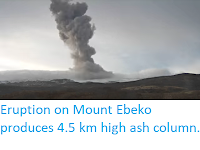Raikoke, a volcanic island in the Kuril Archipelago, erupted at about 4.00 am local time on Saturday 22 June 2019 (about 5.00 pm on Friday 21 June GMT), the first eruption on the island since 1924, and only the third eruption recorded, the first having been in 1778. The eruption produced a volcanic plume that rose to between 13 and 17 km above sea level, which was observed by several satellites, as well as by astronauts on the International Space Station.
Eruption on Raikoke, seen from the International Space Station. Earth Observatory/NASA.
The Kuril Archipelago runs from the northwestern tip of Hokkaido to the
southern tip of the Kamtchatka Peninsula. It marks the southern margin
of the Okhotsk Plate, which underlies the Sea of Okhotsk, the Kamchatka
Peninsula, Sakhalin Island and Tōhoku and Hokkaidō in Japan. Along this
southern margin the Pacific Plate is being subducted beneath the Okhotsk
Plate in the Kuril Trench. As the Pacific Plate sinks under the Okhotsk
Plate it is partial melted by the resultant friction and the heat of
the Earth's interior. Some of the melted material then rises up through
the overlying Okhotsk Plate as magma, fuelling the volcanoes of the Kuril
Archipelago.
Simple diagram showing the subduction of the Pacific Plate beneath the Okhotsk Plate along the Kuril Trench. Auburn University.
See also...
Follow Sciency Thoughts on Facebook.







